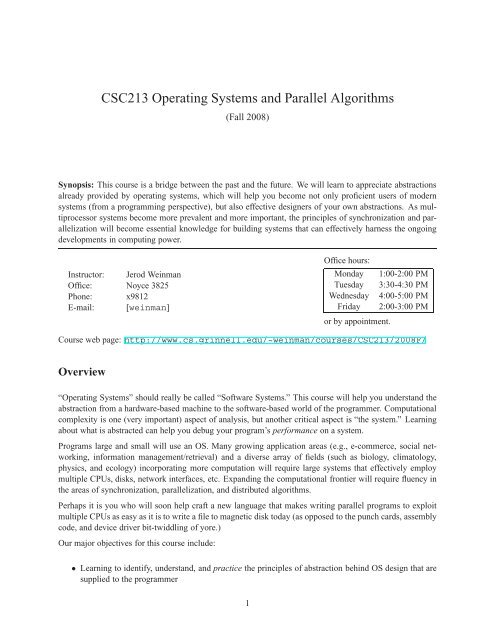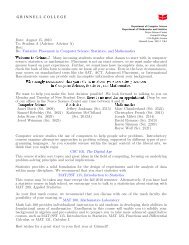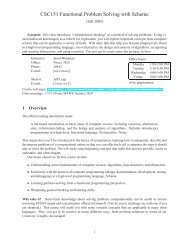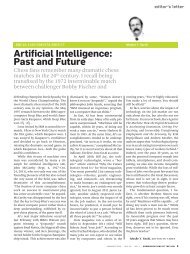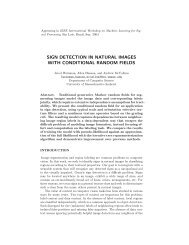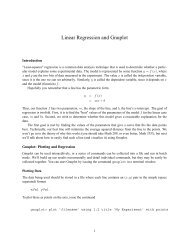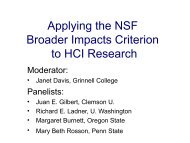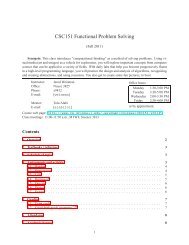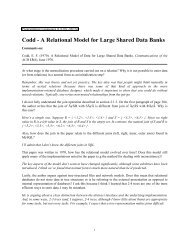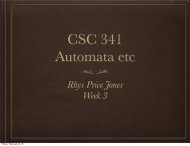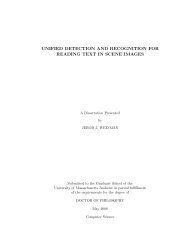CSC213 Operating Systems and Parallel Algorithms - Computer ...
CSC213 Operating Systems and Parallel Algorithms - Computer ...
CSC213 Operating Systems and Parallel Algorithms - Computer ...
Create successful ePaper yourself
Turn your PDF publications into a flip-book with our unique Google optimized e-Paper software.
<strong>CSC213</strong> <strong>Operating</strong> <strong>Systems</strong> <strong>and</strong> <strong>Parallel</strong> <strong>Algorithms</strong><br />
(Fall 2008)<br />
Synopsis: This course is a bridge between the past <strong>and</strong> the future. We will learn to appreciate abstractions<br />
already provided by operating systems, which will help you become not only proficient users of modern<br />
systems (from a programming perspective), but also effective designers of your own abstractions. As multiprocessor<br />
systems become more prevalent <strong>and</strong> more important, the principles of synchronization <strong>and</strong> parallelization<br />
will become essential knowledge for building systems that can effectively harness the ongoing<br />
developments in computing power.<br />
Instructor: Jerod Weinman<br />
Office: Noyce 3825<br />
Phone: x9812<br />
E-mail: [weinman]<br />
Office hours:<br />
Monday 1:00-2:00 PM<br />
Tuesday 3:30-4:30 PM<br />
Wednesday 4:00-5:00 PM<br />
Friday 2:00-3:00 PM<br />
or by appointment.<br />
Course web page: http://www.cs.grinnell.edu/~weinman/courses/<strong>CSC213</strong>/2008F/<br />
Overview<br />
“<strong>Operating</strong> <strong>Systems</strong>” should really be called “Software <strong>Systems</strong>.” This course will help you underst<strong>and</strong> the<br />
abstraction from a hardware-based machine to the software-based world of the programmer. Computational<br />
complexity is one (very important) aspect of analysis, but another critical aspect is “the system.” Learning<br />
about what is abstracted can help you debug your program’s performance on a system.<br />
Programs large <strong>and</strong> small will use an OS. Many growing application areas (e.g., e-commerce, social networking,<br />
information management/retrieval) <strong>and</strong> a diverse array of fields (such as biology, climatology,<br />
physics, <strong>and</strong> ecology) incorporating more computation will require large systems that effectively employ<br />
multiple CPUs, disks, network interfaces, etc. Exp<strong>and</strong>ing the computational frontier will require fluency in<br />
the areas of synchronization, parallelization, <strong>and</strong> distributed algorithms.<br />
Perhaps it is you who will soon help craft a new language that makes writing parallel programs to exploit<br />
multiple CPUs as easy as it is to write a file to magnetic disk today (as opposed to the punch cards, assembly<br />
code, <strong>and</strong> device driver bit-twiddling of yore.)<br />
Our major objectives for this course include:<br />
• Learning to identify, underst<strong>and</strong>, <strong>and</strong> practice the principles of abstraction behind OS design that are<br />
supplied to the programmer<br />
1
• Underst<strong>and</strong>ing modern OS design principles that enable you to build effective large-scale, networked,<br />
or multi-threaded applications<br />
• Fluency in the elements synchronization <strong>and</strong> concurrency along with design principles for parallel<br />
processing<br />
Why take it If you have any interest in advanced computer science study, high-performance computing,<br />
or adding a twist of computation to just about any other science, this course will be highly relevant <strong>and</strong><br />
rewarding for you! This course fulfills the CS major’s systems requirement.<br />
What do I need to know<br />
reasonably adept at<br />
This course assumes you have taken CSC 201. That means you should be<br />
1. the practice of programming (problem analysis, program design, debugging, etc.).<br />
2. programming in the C language<br />
If you’ve taken any of these courses you will be equipped to thrive in this course. If you’re a little rusty<br />
on the C, you should review your earlier class material, Nutt’s background material on the student website<br />
(http://www.aw.com/nutt), or Walker’s An Introduction to C Through Annotated Examples<br />
(http://www.cs.grinnell.edu/~walker/c), <strong>and</strong> keep a C reference h<strong>and</strong>y. (After all, even writers<br />
who are perfectly fluent speakers of English keep a dictionary or style manual close by when practicing<br />
their craft!)<br />
Textbook<br />
Our main textbook is:<br />
Gary Nutt. <strong>Operating</strong> <strong>Systems</strong>, Third Edition. Addison-Wesley, 2000. ISBN: 0-201-77344-9<br />
You may also wish to acquire a good C language reference <strong>and</strong> keep it h<strong>and</strong>y. One trusty example is:<br />
Samuel P. Harbison <strong>and</strong> Guy L. Steel. C: A Reference Manual, Fifth Edition. Prentice Hall,<br />
2002. ISBN: 0-13-08952-X<br />
Occasionally our discussions will be supplemented by other texts or research papers. I will provide these<br />
<strong>and</strong> note them in the detailed class schedule.<br />
Class Meeting<br />
Class MWF 8:00-8:50 am Science 3819<br />
9:00-9:50 am Science 3819 L1<br />
Lab T<br />
2:15-3:05 pm Science 3819 L2<br />
2
Short version: You are expected to attend <strong>and</strong> actively participate in class. I am expected to make class<br />
worth attending.<br />
Longer version: To make class time most valuable for you, I do not plan to lecture on material that is<br />
covered in the textbook. Therefore, you should come to class prepared to clarify, discuss, <strong>and</strong> practice the<br />
ideas in the text by reading any assigned material before class. To facilitate this, you will be contributing<br />
your own questions on the readings for discussion throughout the term. In this way, every class can be<br />
tailored to the areas you are most curious or confused about.<br />
Reading Suggestions<br />
Before each class, you should check the class schedule for updates <strong>and</strong> do any reading that has been assigned.<br />
Reading the assignment entails the following.<br />
Overview You should skim through the reading once to get an overview of the material to be covered. The<br />
first reading can (<strong>and</strong> should be) very quick. (Expected time: 10 to 15 minutes.)<br />
In-Depth Next, read the material closely. Not everything will make sense at this point, but hopefully many<br />
things will. (Expected time: 30 to 45 minutes.)<br />
Final Notes After carefully reading the material, try making a few notes to yourself about what you think<br />
are the most important concepts being covered, as well as any questions you have. (Expected time: 5<br />
to 10 minutes.)<br />
Attendance Policy<br />
Our class meets early, <strong>and</strong> I know that sometimes “things happen.” Therefore, you will be granted one<br />
absence from class (not labs) with no penalty for participation. While I do not take attendance, I will tend<br />
notice your presence or absence as a trend, <strong>and</strong> this can make a large contribution to the participation portion<br />
of your grade. If you wish me to acknowledge your absence as excused, you must either:<br />
1. Notify me at least 7 days in advance to make arrangements for your absence, or<br />
2. Provide me with documentation of your absence’s circumstances post hoc from Health Services or<br />
Student Affairs.<br />
It is very important for you to attend labs because you will work in teams. Don’t let your partner (or yourself)<br />
down!<br />
If you do miss a class, you must first talk to a classmate about any material that you may have missed. After<br />
that, you may follow up with me about any further questions or concerns.<br />
Schedule of Topics<br />
The following is an approximate schedule of topics to be discussed during the course. See the web page<br />
schedule for details.<br />
3
Week Topic Week Topic<br />
1 OS overview 8 Networks <strong>and</strong> sockets<br />
2 <strong>Computer</strong> organization 9 <strong>Parallel</strong> computation<br />
3 Processes <strong>and</strong> threads 10 <strong>Parallel</strong> analysis<br />
4 Process scheduling 11 File management<br />
5 Synchronization 12 Protection <strong>and</strong> securiy<br />
6 Deadlock 13 Distributed computation<br />
7 Memory management 14 Current OS topics<br />
Assignments <strong>and</strong> Activities<br />
Under a normal 16 credit load, I expect that you will spend at least 40 hours per week on your studies (class<br />
time, homework, <strong>and</strong> studying). Thus, you should plan to spend 10 hours/week on work for this course.<br />
With class <strong>and</strong> lab time clocking in at 3 1 3 hours, you’ll have 62 3<br />
hours/week left for the following:<br />
Discussion Questions Throughout the term, you will be expected to submit an average of one discussion<br />
question per class meeting that pertains to that day’s reading. See the course web page for guidelines<br />
on question content <strong>and</strong> submission.<br />
Brief Exercises Questions that engage you in design justification <strong>and</strong>/or a deeper underst<strong>and</strong>ing of abstractions<br />
will be assigned regularly at the end of class <strong>and</strong> posted on the web page. (No more than one<br />
question per class–thus, 1-3 per week). These are due by the beginning of the following class (not<br />
the end, not even ten minutes in). If you have a clear underst<strong>and</strong>ing of the core issues, your answers<br />
should not be longer than one page (they will frequently be shorter, depending on your h<strong>and</strong>writing or<br />
word processor formatting), <strong>and</strong> they should not take you very long (perhaps 30 minutes) if you have<br />
a solid underst<strong>and</strong>ing of the issues. It is also my intent that these questions will be similar in nature to<br />
many that will be on the exams.<br />
Discussion of the class material with your classmates is of course encouraged. However, collaboration<br />
is not permitted on the exercises; engaging with the material yourself to discover what the<br />
relevant issues are will greatly increase your learning. The idea is for you to frequently practice analyzing<br />
system considerations <strong>and</strong> get feedback in a low-stakes framework.<br />
Grading of the exercises will be on a simple ternary scale:<br />
̌ for an adequate, sufficient response<br />
̌+ for a particularly clear or insightful response<br />
̌− for an unclear or insufficient response<br />
I expect most work will receive checks. Of course, no credit will be given if no response is submitted.<br />
No late submissions will be accepted.<br />
Significant Bits From time to time (typically on Mondays), one member of the class will present a five<br />
minute overview/preview/insight/review of a recent development in the broad area of “systems.” The<br />
idea is to establish a practice of following technological developments in the popular <strong>and</strong> technical<br />
press as well as research publication venues. In doing this, you will inform your classmates, at a high<br />
level, about something that relates to the course material in principle <strong>and</strong> goal, rather than necessarily<br />
a particular topic. Your presentation should include what the development is, why it is important, a<br />
bit about how it is/was done, <strong>and</strong> perhaps something on who did it. You will asked to do just one<br />
4
during the semester, so find something interesting <strong>and</strong> share it with us! See the course web page for<br />
the schedule, details, evaluation rubric, <strong>and</strong> suggestions for finding topics.<br />
Laboratory Work We will practice using programmer-level OS elements via the UNIX system call interface<br />
<strong>and</strong> C st<strong>and</strong>ard library in our weekly lab sessions. Since lab time is limited, it is very important<br />
for you to come prepared by reading the assignment <strong>and</strong> any other related material beforeh<strong>and</strong>. You<br />
will start your work in our weekly sessions but complete it outside of lab. Assignments may be broken<br />
into parts with multiple due dates to help you structure your time. You will typically complete these<br />
labs in pairs or groups, oftentimes assigned by me on a rotating basis, <strong>and</strong> only one lab will be submitted<br />
for the group. Everyone whose name appears on a submitted lab report has the responsibility<br />
to ensure everyone fully underst<strong>and</strong>s the submission.<br />
Lab reports will typically be due the following Friday <strong>and</strong>/or Monday after the Tuesday meeting.<br />
See the course webpage <strong>and</strong> the particular lab for submission guidelines <strong>and</strong> formats.<br />
You are not limited to collaborating only with the members of your group. Discussion of concepts<br />
<strong>and</strong> approaches with other classmates is encouraged. Debugging C programs <strong>and</strong> concurrent algorithms<br />
can be difficult <strong>and</strong> is often helped by explaining your code to someone else (which will also<br />
frequently help you to explain the bug to yourself ). All such contributions by others (not in your<br />
gruop) should be properly attributed in your report. Furthermore, all the work you submit (code, experimental<br />
data, write-ups, etc.) must be that of the group. Code provided by the instructor or the text<br />
should be attributed, but no other code or written work (from any source) may be shared with others<br />
or copied for your own use.<br />
Exams As opportunities for you to demonstrate your design prowess <strong>and</strong> grasp of OS abstraction principles,<br />
there will be two hour exams as well as a cumulative final exam.<br />
Hour Exam 1 Friday, October 3<br />
Hour Exam 2 Friday, November 14<br />
Final Exam Tuesday, December 16 (2 PM)<br />
Do not make airline reservations that will conflict with your final exam schedule.<br />
You are highly encouraged to use the PioneerWeb Discussion Board for questions related to the course or<br />
laboratory exercises. If a post is related to an assignment, it must adhere to the st<strong>and</strong>ards of collaboration<br />
for that particular assignment. If you are debugging, one good rule of thumb is to not post code; however, it<br />
is possible that error messages may be enlightening to others. (I often find that when I am explaining some<br />
error by writing up a post or email, I typically find its source.)<br />
Grading<br />
My goal is for everyone taking this course to be able to demonstrate familiarity <strong>and</strong> fluency with the course<br />
concepts. I would be very happy if you all met the goals above <strong>and</strong> received “A”s. The following weighting<br />
will provide a basis for evalution,<br />
5
Laboratory Work 45%<br />
Exercises 10%<br />
Discussion & Participation 10%<br />
Hour Exams 20%<br />
Final Exam 15%<br />
with the caveat that you must pass the final exam to pass the course.<br />
Academic Honesty<br />
You, as students, are members of the academic community. Both the College <strong>and</strong> I expect the highest<br />
st<strong>and</strong>ards of academic honesty. (See the Grinnell College Student H<strong>and</strong>book, e.g.,<br />
http://www.grinnell.edu/offices/studentaffairs/shb/section3/academichonesty).<br />
Among other things, this means clearly distinguishing between work that is your own, <strong>and</strong> work that should<br />
be attributed to others. It is expected that the collaboration policies given in this syllabus <strong>and</strong> on particular<br />
assignments will be followed. Furthermore, any program results or output must be faithfully recorded, not<br />
forged. (A thoughtful explanation of unexpected behavior can often be a worthwhile submission <strong>and</strong> is<br />
much better than the alternative.)<br />
As an instructor, I will meet my obligation to bring any work suspected to be in violation of the College’s<br />
Academic Honesty Policy to the attention of the Committee on Academic St<strong>and</strong>ing, after which there is no<br />
recourse with me.<br />
Deadlines<br />
Assignments are due at the beginning of class (or lab) on the specified date. Exercises <strong>and</strong> laboratory reports<br />
due on days for which you have a prior excused absence must still be submitted by the deadline (via email<br />
or classmate proxy).<br />
For the laboratory reports, a late penalty of 33.33% will be deducted at each subsequent class or lab meeting.<br />
Thus, you have at most two additional meetings to submit your work.<br />
Because the brief exercises are intended to be relatively frequent, low-stakes assignments, no late submissions<br />
will be accepted.<br />
Exception: Deadlines for programming-based assignments will automatically be extended by at least one<br />
class period if MathLAN is down for an unscheduled period of 3 or more hours during the week preceding<br />
the assignment due date.<br />
Contacting Me<br />
Please come by during my office hours to discuss the course content, get any extra assistance, or just talk<br />
about how the course is going. Note that if multiple students have similar questions or issues, we may work<br />
together as a group. If you cannot attend a scheduled office hour, you may also email me to schedule an<br />
appointment; please include 3-4 possible meeting times so that I can pick one that works for me.<br />
6
I enjoy getting to know my students, but I prefer to reserve office hours for academic matters. If you<br />
would like to have a more informal conversation, I would be delighted to accept an invitation to lunch<br />
(http://www.grinnell.edu/offices/studentaffairs/chaplain/religous<strong>and</strong>spiritualprograms).<br />
Email is also a reliable way to contact me, but please allow 24 hours for a response (except on weekends,<br />
when I do not regularly read email). You may also call me in my office (x9812) for more urgent matters<br />
(e.g., you will be missing a lab due to illness).<br />
Accommodations<br />
If you have any disability that requires accommodations, please meet with me right away so that we can work<br />
together to find accommodations that meet your learning needs. You will also need to provide documentation<br />
of your disability to the Dean for Student Academic Support <strong>and</strong> Advising, Joyce Stern, located on the 3rd<br />
floor of the Rosenfield Center (x3702).<br />
With thanks to Janet Davis for the “Reading Suggestions” <strong>and</strong> other key policies.<br />
7


